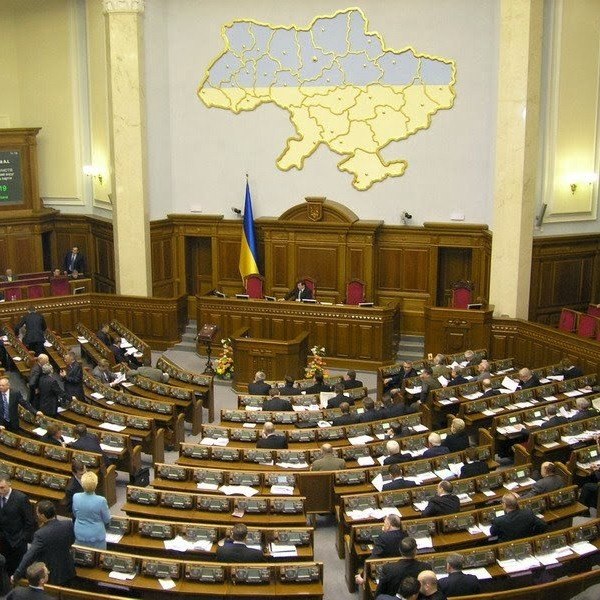(Co-authored by Vincent Post) The idea of lustration is gaining momentum in Ukraine. A recent survey shows that nearly 80 percent of respondents support the policy. Lustration (from the Latin verb lustrare, to ceremonially purify) refers to a policy that seeks to cleanse a new regime from the remnants of the past. The process involves screening new officials (elected or appointed) for involvement in the former regime and sets some consequences if they are found to have been involved. These consequences can range from publicizing information about collaboration in the previous regime, through dismissal and banning from holding certain offices.
Lustration started gathering attention during the Euromaidan protests, initially in the context of discussions on how to root out political corruption, which has permeated Ukrainian governments. Investigative journalist and Euromaidan Council member Egor Sobolev became one of the most vocal proponents of the idea, and just a couple of days after Yanukovych’s ouster, was appointed to head a Lustration Committee, attached to the Cabinet of Ministers. As a first step toward lustration, Ukraine’s parliament has taken preliminary steps to prepare a bill on judicial lustration. If the bill becomes law, all court chairs appointed by Yanukovych will be fired from their administrative positions. All judges will be screened for corruption and participation in politicized justice during Euromaidan, and those who do not pass the review will be fired and possibly criminally prosecuted for corruption. In addition, the Lustration Committee and the Ministry of Justice are currently working on a broader law on lustration. Sobolev has said in interviews that the goal of the lustration law will be to ban Yanukovych and his closest allies from politics for life, as well as to screen and remove those who are “agents of foreign secret service, people who have been involved in corruption, and people who have been involved in the destruction of democracy.” The radical nationalist party, Svoboda, has already submitted its version of a general law on lustration for consideration in parliament. In addition to the parameters discussed by Egor Sobolev, the Svoboda bill envisions lustrating all former KGB informants. The Svoboda bill stipulates that public servants at all levels, as well as applicants for state jobs will have to undergo a screening procedure. Those who fail the screening will be dismissed from their positions.
Ukrainian supporters of lustration often invoke the experience of other post-communist states (Czechoslovakia, Poland, Hungary, Baltics, Georgia), and argue that lustration had positive effects on democratization and good governance in the region. However, the lustration laws that neighboring countries passed after the end of communism are very different from what is being proposed in Ukraine. The context of transitions away from communist one-party rule towards liberal democracy is very different from what Ukraine is experiencing today, and produced very different laws in response. Lustration laws identify a list of offices in the new regime that are subject to lustration, as well as a list of activities in the past regime that trigger a “positive lustration.” Finally, they determine which consequences a positive lustration has for an individual. The Ukrainian proposals are markedly different from currently existing lustration law in all three regards. Generally speaking, the laws passed after 1989 in East and Central Europe were designed to lustrate the bureaucracy from those who had worked for or collaborated with the communist secret service. These laws either dismiss former secret service personnel from the bureaucracy, or they simply publish that information. There is some diversity in those early lustration laws. For instance, the Czechoslovakian law focused not only on secret service personnel but also removed and barred certain communist party officials from the bureaucracy. This is not the case in Poland and Hungary, but in those countries, lustration also applies to certain political offices (such as the presidency), which is not true in Czechoslovakia. On the whole, although there is some variation in the scope of lustration laws passed in East and Central Europe after the fall of communism, these policies all share the same rough attributes: They were all attempts to remove secret service agents and informants from the state bureaucracy in the new regime.
Ukraine’s proposed policies do not fit this general pattern. The non-public, secret nature of regime involvement that the earlier lustration laws address is absent in Ukraine. Ukraine’s laws, instead, will target people for overt support for the Yanukovich regime. Moreover, while the other laws primarily lustrate the bureaucracy, Ukraine’s proposed lustration aims at removing Yanukovich and his closest associates from political office, handing them lifetime bans from politics. The consequences for those affected by lustration reach much further than anything devised in East and Central Europe after 1989. The Czechoslovakian law, which is amongst the harshest in the region, does not affect political figures; the Polish law, which does, only bans people from politics if they lie about their past, and when it does ban people, it only does so for ten a year period. Neither of these lustration laws proposes criminal prosecution for collaboration with the previous regime, recognizing that collaboration was not a crime at the time; but the Ukrainian law, uniquely, does link lustration to prosecution.
To the extent that there is similarity between the proposed Ukrainian lustration and the lustration laws on the books elsewhere in the region, it is important to note that there is no hard evidence that lustration laws contributed to democracy, that they improved governance, or that they curbed corruption. Some have claimed such positive effects off the cuff, but no study has shown them empirically. In the majority of cases, lustration laws were passed well after the transition to democracy had been completed, in countries where the transition to democracy had been a relatively smooth process. Thus if any correlation does exist between lustration and a successful democratic transition, the direction of causality may actually run from the latter to the former. Of course, one might argue that Ukrainian regime change is still under way, but that lustration can be a tool in accomplishing that goal. However, nothing of the sort occurred in any other place that introduced lustration.
Before adopting lustration, Ukrainian politicians should think carefully about how to define the scope and content of the policy. If they opt for imposing lifetime bans on participation in politics for certain elites, they should be aware that such move would be unprecedented in the post-Communist region. They should also consider the consequences of lustrating most of the Party of Regions officials, because of the extremely lopsided regional effects of such a policy. Despite the temptation to start anew by removing remnants of the Yanukovych regime, incorporating, rather than lustrating Southern and Eastern Ukrainian elites might contribute more to Ukraine’s political stability. And last, but not least, lustration proponents would do well to take notice that the front-runner in the upcoming presidential election, Petro Poroshenko, an early supporter of Euromaidan, is also a co-founder of the Party of Regions and a former minister in Yanukovych’s cabinet.










